2023年中考英语复习 专题七 连词和状语从句课件(共48张PPT)
文档属性
| 名称 | 2023年中考英语复习 专题七 连词和状语从句课件(共48张PPT) |  | |
| 格式 | ppt | ||
| 文件大小 | 2.4MB | ||
| 资源类型 | 教案 | ||
| 版本资源 | 人教新目标(Go for it)版 | ||
| 科目 | 英语 | ||
| 更新时间 | 2023-06-11 15:45:57 | ||
图片预览

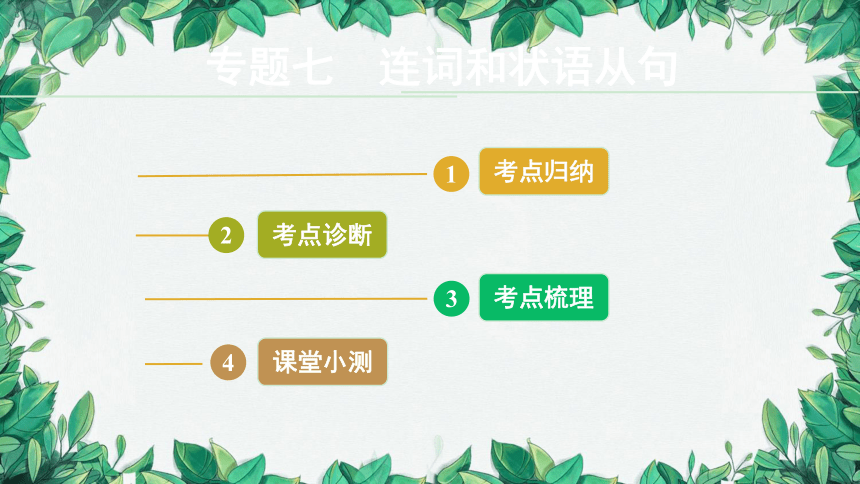
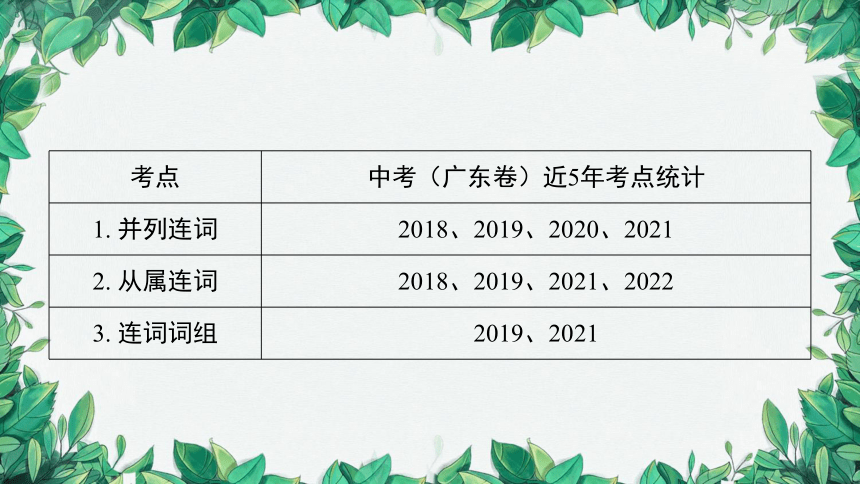
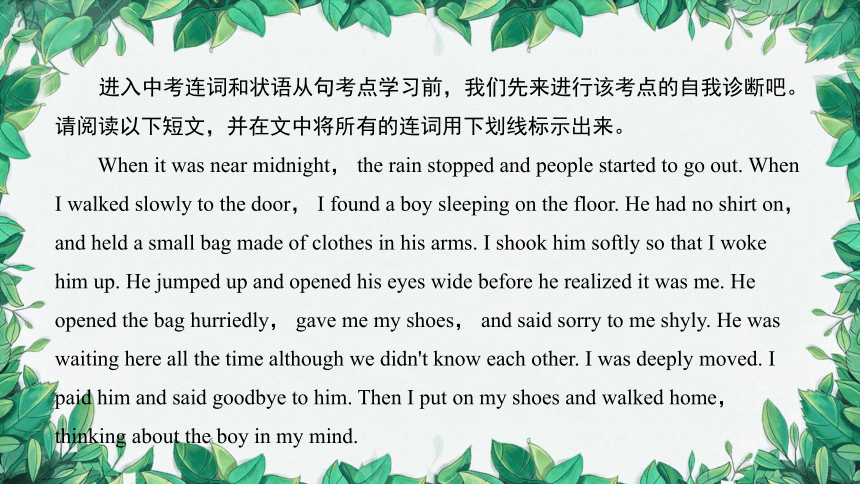
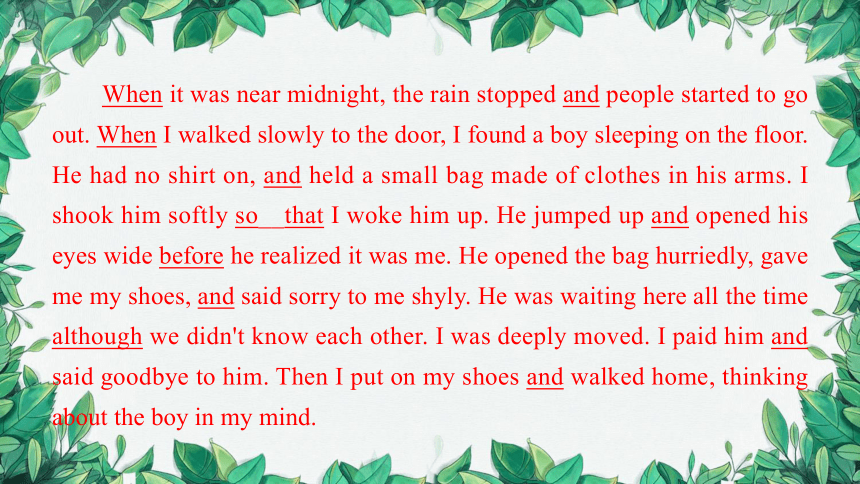


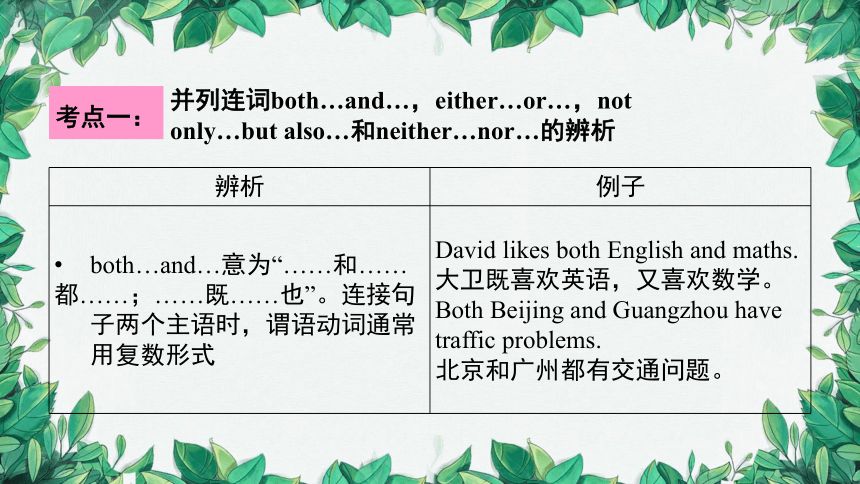
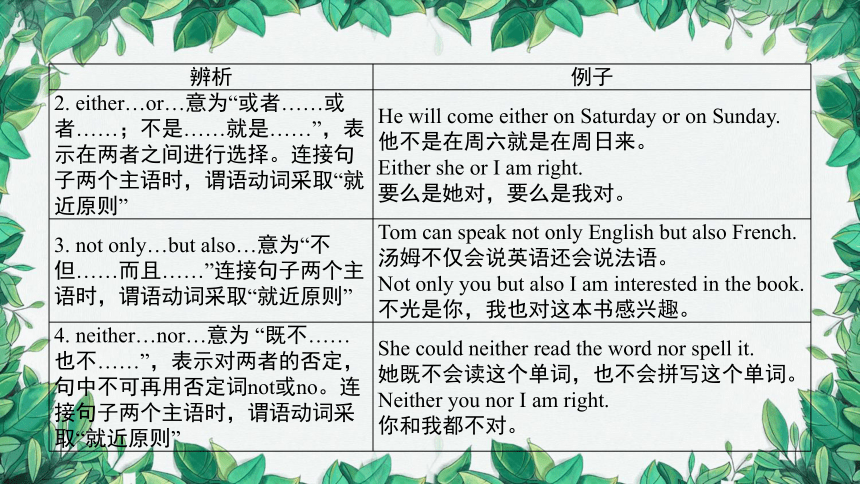
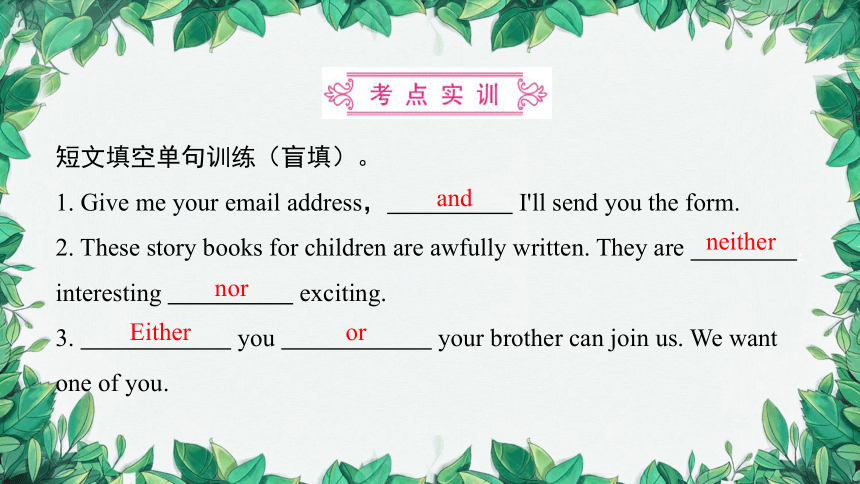
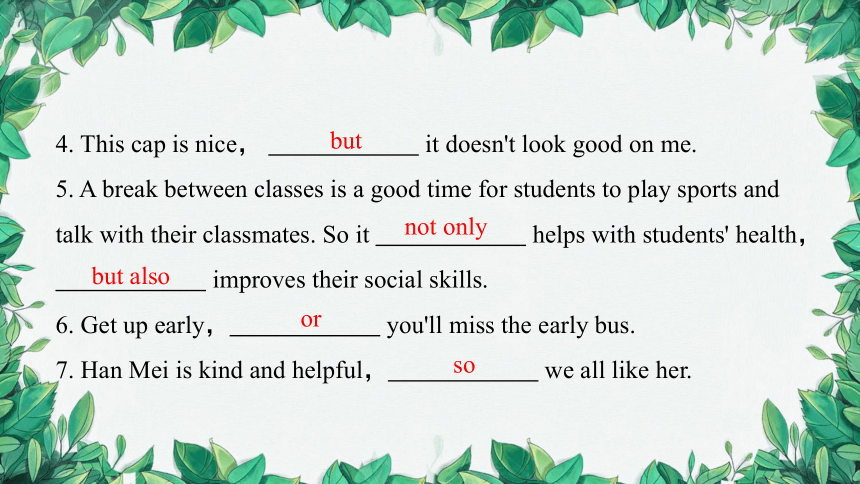
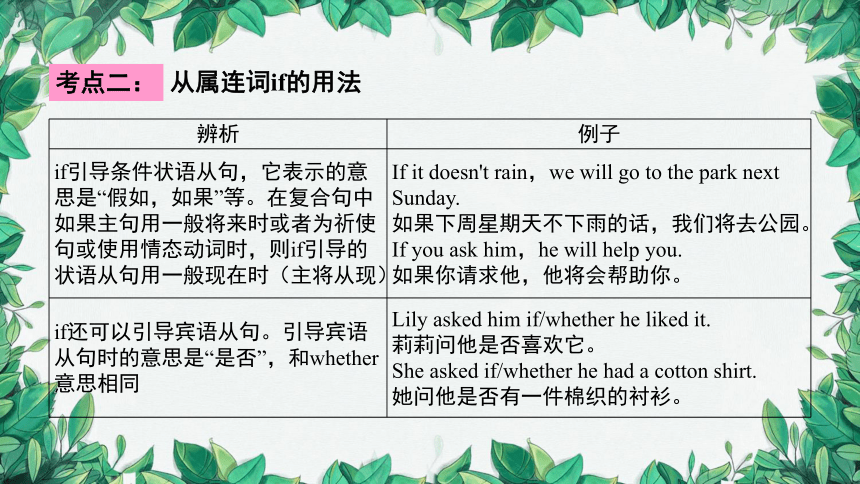
文档简介
(共48张PPT)
第一部分
语法专题训练
1
考点归纳
2
考点诊断
3
考点梳理
4
专题七 连词和状语从句
课堂小测
考点 中考(广东卷)近5年考点统计
1. 并列连词 2018、2019、2020、2021
2. 从属连词 2018、2019、2021、2022
3. 连词词组 2019、2021
进入中考连词和状语从句考点学习前,我们先来进行该考点的自我诊断吧。请阅读以下短文,并在文中将所有的连词用下划线标示出来。
When it was near midnight, the rain stopped and people started to go out. When I walked slowly to the door, I found a boy sleeping on the floor. He had no shirt on, and held a small bag made of clothes in his arms. I shook him softly so that I woke him up. He jumped up and opened his eyes wide before he realized it was me. He opened the bag hurriedly, gave me my shoes, and said sorry to me shyly. He was waiting here all the time although we didn't know each other. I was deeply moved. I paid him and said goodbye to him. Then I put on my shoes and walked home, thinking about the boy in my mind.
When it was near midnight, the rain stopped and people started to go out. When I walked slowly to the door, I found a boy sleeping on the floor. He had no shirt on, and held a small bag made of clothes in his arms. I shook him softly so__that I woke him up. He jumped up and opened his eyes wide before he realized it was me. He opened the bag hurriedly, gave me my shoes, and said sorry to me shyly. He was waiting here all the time although we didn't know each other. I was deeply moved. I paid him and said goodbye to him. Then I put on my shoes and walked home, thinking about the boy in my mind.
语法分析:连词是连接单词,短语或句子的虚词。连词可以分为并列连词和从属连词。
并列连词
and 和 but 但是 or 或者,否则
so 因此,所以 while 然而 yet 但是
both…and… ……和……都;
既……也…… either…or… 或者……或者……;
不是……就是……
not only…but also… 不但……而且…… neither…nor… 既不……也不……
并列连词both…and…,either…or…,not only…but also…和neither…nor…的辨析
考点一:
辨析 例子
both…and…意为“……和……
都……;……既……也”。连接句子两个主语时,谓语动词通常用复数形式 David likes both English and maths.
大卫既喜欢英语,又喜欢数学。
Both Beijing and Guangzhou have traffic problems.
北京和广州都有交通问题。
辨析 例子
2. either…or…意为“或者……或者……;不是……就是……”,表示在两者之间进行选择。连接句子两个主语时,谓语动词采取“就近原则” He will come either on Saturday or on Sunday.
他不是在周六就是在周日来。
Either she or I am right.
要么是她对,要么是我对。
3. not only…but also…意为“不但……而且……”连接句子两个主语时,谓语动词采取“就近原则” Tom can speak not only English but also French.
汤姆不仅会说英语还会说法语。
Not only you but also I am interested in the book.
不光是你,我也对这本书感兴趣。
4. neither…nor…意为 “既不……也不……”,表示对两者的否定,句中不可再用否定词not或no。连接句子两个主语时,谓语动词采取“就近原则” She could neither read the word nor spell it.
她既不会读这个单词,也不会拼写这个单词。
Neither you nor I am right.
你和我都不对。
短文填空单句训练(盲填)。
1. Give me your email address, I'll send you the form.
2. These story books for children are awfully written. They are . interesting exciting.
3. you your brother can join us. We want one of you.
and
neither
nor
Either
or
4. This cap is nice, it doesn't look good on me.
5. A break between classes is a good time for students to play sports and talk with their classmates. So it helps with students' health,
improves their social skills.
6. Get up early, you'll miss the early bus.
7. Han Mei is kind and helpful, we all like her.
but
not only
but also
or
so
考点二:
从属连词if的用法
辨析 例子
if引导条件状语从句,它表示的意思是“假如,如果”等。在复合句中如果主句用一般将来时或者为祈使句或使用情态动词时,则if引导的状语从句用一般现在时(主将从现) If it doesn't rain,we will go to the park next Sunday.
如果下周星期天不下雨的话,我们将去公园。
If you ask him,he will help you.
如果你请求他,他将会帮助你。
if还可以引导宾语从句。引导宾语从句时的意思是“是否”,和whether意思相同 Lily asked him if/whether he liked it.
莉莉问他是否喜欢它。
She asked if/whether he had a cotton shirt.
她问他是否有一件棉织的衬衫。
单项选择。
( )8. Mr. Smith has helped me a lot, I'm thankful to him. (2022·北京)
A.or B.but C.for D.so
( )9. —I don't know if his uncle .
—I think he if it doesn't rain.
A.will come; will come B.comes; will come
C.will come; comes D.comes; comes
D
A
( )10. —I wonder if she to the ball.
—She is sure to come if she time tonight.
A.comes; has B.will come; will have
C.comes; will have D.will come; has
( )11. Success depends on we try our best or not.
A.unless B.as long as C.while D.whether
D
D
从属连词when,while的用法:when,while都有“当……时候”的意思。
考点三:
辨析 例子
when既可表示某一点时间,也可以表示某一段时间。在when引导的时间状语从句中,其谓语动词可以是延续性的,也可以是非延续性的,可与主句中的谓语动词同时发生,也可在其后发生 I was just reading a book when she came into my room. 她走进我房间时,我正在看书。
Were you writing when the teacher came in?
老师进来的时候,你在写信吗?
while只能表示某一段时间,不能表示某一点时间。在while引导的时间状语从句中,其谓语动词只能是延续性的,而且也只能与主句中的谓语动词同时发生或存在 While Jim was mending his bike,Lin Tao came to see him. 正当吉姆修自行车时,林涛来看他。
Jenny is doing her homework while Simon is watching TV. 西蒙在看电视的时候,珍妮在做家庭作业。
1. while引导的时间状语从句多用进行时态,主从句的动作都是进行时的时候只能用while。
I was doing my homework when my mother came back home yesterday evening.
昨天晚上妈妈回家的时候,我正在做家庭作业。
While/When I was doing my homework,my mother came back home yesterday evening.
昨天晚上当我正在做家庭作业的时候,妈妈回家了。
While I was cooking in the kitchen, my brother was watching TV in the living room.
当我在厨房做饭时,我的弟弟在客厅看电视。
2. when 和while还可作并列连词。when 表示“在那时”;while表示“而、却”表对照关系。
The children were running when they heard the sound of a motor bike.
孩子们正在跑步,这时他们听到了摩托车的声音。
He is strong while his brother is weak. 他长得结实而他弟弟却很瘦弱。
短文填空单句训练(盲填)。
12. It was the middle of the night the sound of the piano woke me up.
13. Jim was mending his bike, Lin Tao came to see him.
14. I came in he was reading an interesting book in his room.
15. I was having a class on Ding Talk, my mother was cooking in the kitchen.
when
When/While
when/while
While
并列连词and和or在“祈使句+and/or+简单句”句式中的运用。
1. “祈使句+and+简单句” 与 “If you…,you'll…” 同义。
Work hard,and you will pass the exam. 努力学习,你会通过考试。
=If you work hard,you will pass the exam.
如果你努力学习,就会通过考试。
=If you don't work hard,you won't pass the exam.
如果你不努力,就不会通过考试。
2. “祈使句+or+简单句”与“If you don't…,you'll…”同义,其中or意为“否则”。
Hurry up,or you will miss the bus.
快点,否则你就错过公交车了。
=If you hurry up,you won't miss the bus.
如果你快点,就不会错过公交车了。
=If you don't hurry up,you will miss the bus.
如果你不快点,就错过公交车了。
状语从句在复合句中起状语的作用,修饰主句中的谓语动词、形容词或副词。状语从句由从属连词引导,从属连词在句中不充当句子成分,只起连接作用。根据意义可分为时间状语从句、地点状语从句、原因状语从句、目的状语从句、方式状语从句、条件状语从句、结果状语从句、让步状语从句、比较状语从句。
考点四:
状语从句
1. 时间状语从句
引导时间状语从句的连词有:when,before,after,while,since,as,till,as soon as,until等。
(1)when 当……的时候
when引导时间状语从句时,表示主句的动作与从句的动作是同时发生的,或者从句的动作发生在主句之前的。可表示“一段时间”或“时间点”。
eg. She was reading a book when I called her.
我打电话给她时,她在看书。
(2)while 当……的时候
while引导的时间状语从句只能表示一段时间(与延续性动词连用),不能表示时间点(不可与非延续性动词连用)
eg. While she was doing her homework,her mother was doing the cooking.
她做作业时,她的妈妈在做饭。
I came in while he was watching TV. 他看电视时,我进来了。
(3)until=till 直到
until,till引导的时间状语从句时,主句与从句都是肯定句,主句的谓语动词为延续性动词。当主句用否定句,从句用肯定句,主句的谓语动词为非延续性动词,即是not…until…结构,意为“直到……才……”,常可以与after,before进行句型转换。
eg. I will stand here until your father comes back.
我会站在这儿等你爸爸回来。
He didn't go home until he finished his homework.
=He went home after he finished his homework.
直到做完作业,他才回家。
(4)as soon as 一……就……
eg. I will tell him about this as soon as he comes back.
他一回来,我就告诉他这件事情。
注意:不管主句是用一般将来时,还是一般现在时,或主句是祈使句时,时间状语从句都用一般现在时,不能用一般将来时。
I will tell him the news when he gets back tomorrow.
当他明天回来时,我会告诉他这个消息。
2. 条件状语从句
引导条件状语从句的连词或短语有: if,unless= if… not(除非……,如果不……);as long as(只要) 。
What will you do if it rains tomorrow? 如果明天下雨,你将干什么?
You will fall behind others unless you work hard. =You will fall behind others if you don't work hard.
你会落后于别人,除非你努力学习。
As long as you help us, we will finish the task on time.
只要你帮助我们,我们就会按时完成任务。
注意:主句用一般将来时,从句要用一般现在时表示一般将来时(主将从现)。
3. 地点状语从句
地点状语从句用连词where和wherever引导。
She follows him wherever he goes. 他无论到哪里她总跟着。
4. 原因状语从句
引导原因状语从句的连词有:because(因为),since(既然),as(由于)等。
◇because表示事情发生的直接原因。
He didn't come to school today because he was ill.
因为他病了,所以没上学。
◇since意为“既然,因为”,since从句表示显然的或已知道的理由。
Since everybody is here,let's begin our meeting. 既然大家都在这儿,让我们开始我们的会议吧。
◇as引导原因状语从句,意思是“由于”,表“双方已经知道的原因”,与because相比,较口语化,只是对结果的附带说明,所表达的原因语气较弱。
As the weather is so bad, we have to delay our journey.
因为天气太糟糕,我们不得不推迟旅游。
5. 比较状语从句
引导比较状语从句的连词有:than,as…as…,not as…as…等。
Tom went to school earlier than Jim. 汤姆上学比吉姆早。
English is as important as Chinese. 英语与语文一样重要。
6. 结果状语从句
引导结果状语从句的连词有:so…that….,such…that…,意思都是“如此……以致……”,so之后接形容词或副词,such之后接名词。
◇ so+ 形容词/副词+that…
◇ such + 名词+ that…
◇ so many/few+可数名词复数+that…
◇ so much/little+不可数名词+that…
eg. The girl is so young that she can't go to school.
女孩太小,以致不能上学。
He is such a kind teacher that we all like him.
他是如此好的老师,以至我们都喜欢他。
注意:so…that…可以和too…to…,not…enough to…句型转换。
eg. The box is so heavy that we can't move it. =The box is too heavy for us to move.
=The box is not light enough for us to move.
这个箱子太重,我们搬不动。
7. 目的状语从句
引导目的状语从句的连词有:so that,in order that 等。从句in order that 可以用in order to do sth. 来转换。
I sit in the front of the classroom so that I can hear the teacher clearly.
=I sit in the front of the classroom in order that I can hear the teacher clearly.
=I sit in the front of the classroom in order to hear the teacher clearly.
我坐在教室的前面为了能听清楚老师说的话。
8. 让步状语从句
引导让步状语从句的连词有:although,though,even though,even if,和no matter…短语等。
Although he is young,he knows a lot. 尽管他年轻,但他懂很多。
注意:(1)though与but;because与so 不能出现在同一组主从复合句中,二者只能取其中一个。
Although he is young,he knows a lot. =He is young but he knows a lot.
no matter 短语有:no matter what=whatever,no matter when=whenever,no matter who= whoever,no matter where= wherever
(2)让步状语从句不能用一般将来时,要用一般现在时表示一般将来时。
9. 注意:when和if在宾语从句与条件状语从句时的时态问题。when和if引导宾语从句时,后接的从句该用什么时态就用什么时态;引导条件状语从句,后接的从句用一般现在时表将来时。如:
(1)I don't know when he will come(宾语从句,他还没来,用一般将来时). If he comes(条件状语从句),please ring me up at once. 我不知道他什么时候来。如果他来,请马上给我电话。
(2)He wonders if he will go with her this afternoon(宾语从句,他还没去,用一般将来时). If he goes with her(条件状语从句),he will tell her by himself. 他不知道他下午是否和她去。如果他和她去,他会亲自告诉她。
一、单项选择。
( )16. We should take care of the earth we can make a better world to live in.
A.so that B.until
C.even if D.while
A
( )17. —Which show do you prefer, Running Man or Singers 2021?
—Running Man,of course. I my brother likes it.
A.Both; and B.Neither; nor
C.Either; or D.Not only; but also
( )18. American Agent(《美国特工》) is Wonderful
I want to see it a second time.
A.such; that B.so; that C.too; to D.enough; to
D
B
( )19. —Excuse me. Is it my turn now?
—Not yet. Please wait on the chair your name is called.
A.and B.until C.although D.since
( )20. —I really want to pass the exam for further study.
—Believe in yourself,dear!Your dream will come true you put your heart into it.
A.even if B.as long as
C.as soon as D.even though
B
B
( )21. Our school football team won't win the match . we work hard together.
A.if B.unless C.because D.when
( )22. StorySign is a useful app it can make it easier for deaf children and their parents to read bedtime stories.
A.so;that B.such;that C.too;to D.as;as
B
B
( )23. —Lucy, you can't use the phone we are far from the gas(天然气) station.
— OK, I won't do that again.
A.after B.when C.until D.though
C
( )24. —How long have you felt this way?
— I woke up this morning.
A.After B.When C.Since D.Before
( )25. You must make sure your mask(口罩) is clean
you put it on.
A.before B.after C.since D.where
C
A
二、短文填空单句训练。(盲填)
26. you must go and play football, at least wait until school is over.
27. I was late for class my alarm clock didn't go off.
28. I still keep taking exercise every day I am busy with so many subjects.
29. Frank has been teaching in this school he came to China.
30. You should knock at the door you enter the room.
If
because
although/though
since
before
(满分:25分) 你的得分:
一、语法选择。(共10小题,每小题1分,共10分)
Researchers at an American university are working to create special chewing gum(口香糖) to help reduce the spread of COVID -19.
Experts agree that vaccination(接种疫苗) is 1 of all the ways to fight against COVID -19, but vaccinated people can still spread it.
( )1. A. good B.better C.the best
C
So researchers are hoping that their chewing gum will give people 2 . useful and low -cost way to prevent COVID- 19 from 3 .
“This chewing gum is made 4 a plant. It has a material 5 . can kill the virus in the mouth. ”
( )2. A. / B.a C.an
( )3. A. spread B.spreads C.spreading
( )4. A. from B.of C.with
( )5. A. who B./ C. which
B
C
A
C
Henry Daniel, the leader of the research, explained, “So the virus can not revive(复活) inside the body. ” That's why 6 useful to prevent COVID 19.
The research is still in 7 early periods. The researchers are planning to carry out a clinical trial (临床试验) in humans to decide whether people can use it 8 and whether it's effective.
( )6. A. it is B.is it C.it was
( )7. A. its B.it's C.it
( )8. A. safe B.safely C.safety
A
A
B
If it 9 , people can use it in situations where they need to be close to each other, such as teeth cleaning by a doctor.
“We are already using masks and other things to reduce the spread,” Daniel said. “This gum can 10 as another tool to win this fight. I hope we can succeed in this research. ”
( )9. A. will work B.is working C.works
( )10. A. use B.be used C.be using
B
C
二、短文填空。(共10小题,每小题1. 5分,共15分)
Tea to some people in Eastern countries is like air or water. It's something 11 they can't live without.
When I was 22 years old, I experienced a neighbor's deep and warm kindness. I was very 12 and lost at that moment. My neighbor invited me to have tea at her home one evening. That night, she set out a beautiful tea set. She told 13 all about her poor life story.
11. 12. 13. .
me
that
sad/upset/unhappy
She told me, over that cup of tea, that all her pain was gone at last. She suggested that I make a detailed(详细的) plan about 14 to go forward. We ended our evening tea at 2 a.m. It was truly 15 heartwarming and unforgettable cup of tea.
Ten years ago, I 16 as an English teacher in Japan. One young woman wanted to 17 “thank you” in a special way when her lessons were over.
14. 15. . 16. 17. .
how
a
worked
say
During the final lesson, she brought her tea set—a lovely box with all the things that are needed 18 tea ceremony(茶道). She didn't ask me to drink 19 she finished a set of performance. I was surprised at the beauty of her gift and at her kind heart. It was so much more than a cup of 20 !
When you are low, why not have a cup of tea and enjoy how calm and happy it makes you feel?
18. 19. 20. .
for
until
tea
第一部分
语法专题训练
1
考点归纳
2
考点诊断
3
考点梳理
4
专题七 连词和状语从句
课堂小测
考点 中考(广东卷)近5年考点统计
1. 并列连词 2018、2019、2020、2021
2. 从属连词 2018、2019、2021、2022
3. 连词词组 2019、2021
进入中考连词和状语从句考点学习前,我们先来进行该考点的自我诊断吧。请阅读以下短文,并在文中将所有的连词用下划线标示出来。
When it was near midnight, the rain stopped and people started to go out. When I walked slowly to the door, I found a boy sleeping on the floor. He had no shirt on, and held a small bag made of clothes in his arms. I shook him softly so that I woke him up. He jumped up and opened his eyes wide before he realized it was me. He opened the bag hurriedly, gave me my shoes, and said sorry to me shyly. He was waiting here all the time although we didn't know each other. I was deeply moved. I paid him and said goodbye to him. Then I put on my shoes and walked home, thinking about the boy in my mind.
When it was near midnight, the rain stopped and people started to go out. When I walked slowly to the door, I found a boy sleeping on the floor. He had no shirt on, and held a small bag made of clothes in his arms. I shook him softly so__that I woke him up. He jumped up and opened his eyes wide before he realized it was me. He opened the bag hurriedly, gave me my shoes, and said sorry to me shyly. He was waiting here all the time although we didn't know each other. I was deeply moved. I paid him and said goodbye to him. Then I put on my shoes and walked home, thinking about the boy in my mind.
语法分析:连词是连接单词,短语或句子的虚词。连词可以分为并列连词和从属连词。
并列连词
and 和 but 但是 or 或者,否则
so 因此,所以 while 然而 yet 但是
both…and… ……和……都;
既……也…… either…or… 或者……或者……;
不是……就是……
not only…but also… 不但……而且…… neither…nor… 既不……也不……
并列连词both…and…,either…or…,not only…but also…和neither…nor…的辨析
考点一:
辨析 例子
both…and…意为“……和……
都……;……既……也”。连接句子两个主语时,谓语动词通常用复数形式 David likes both English and maths.
大卫既喜欢英语,又喜欢数学。
Both Beijing and Guangzhou have traffic problems.
北京和广州都有交通问题。
辨析 例子
2. either…or…意为“或者……或者……;不是……就是……”,表示在两者之间进行选择。连接句子两个主语时,谓语动词采取“就近原则” He will come either on Saturday or on Sunday.
他不是在周六就是在周日来。
Either she or I am right.
要么是她对,要么是我对。
3. not only…but also…意为“不但……而且……”连接句子两个主语时,谓语动词采取“就近原则” Tom can speak not only English but also French.
汤姆不仅会说英语还会说法语。
Not only you but also I am interested in the book.
不光是你,我也对这本书感兴趣。
4. neither…nor…意为 “既不……也不……”,表示对两者的否定,句中不可再用否定词not或no。连接句子两个主语时,谓语动词采取“就近原则” She could neither read the word nor spell it.
她既不会读这个单词,也不会拼写这个单词。
Neither you nor I am right.
你和我都不对。
短文填空单句训练(盲填)。
1. Give me your email address, I'll send you the form.
2. These story books for children are awfully written. They are . interesting exciting.
3. you your brother can join us. We want one of you.
and
neither
nor
Either
or
4. This cap is nice, it doesn't look good on me.
5. A break between classes is a good time for students to play sports and talk with their classmates. So it helps with students' health,
improves their social skills.
6. Get up early, you'll miss the early bus.
7. Han Mei is kind and helpful, we all like her.
but
not only
but also
or
so
考点二:
从属连词if的用法
辨析 例子
if引导条件状语从句,它表示的意思是“假如,如果”等。在复合句中如果主句用一般将来时或者为祈使句或使用情态动词时,则if引导的状语从句用一般现在时(主将从现) If it doesn't rain,we will go to the park next Sunday.
如果下周星期天不下雨的话,我们将去公园。
If you ask him,he will help you.
如果你请求他,他将会帮助你。
if还可以引导宾语从句。引导宾语从句时的意思是“是否”,和whether意思相同 Lily asked him if/whether he liked it.
莉莉问他是否喜欢它。
She asked if/whether he had a cotton shirt.
她问他是否有一件棉织的衬衫。
单项选择。
( )8. Mr. Smith has helped me a lot, I'm thankful to him. (2022·北京)
A.or B.but C.for D.so
( )9. —I don't know if his uncle .
—I think he if it doesn't rain.
A.will come; will come B.comes; will come
C.will come; comes D.comes; comes
D
A
( )10. —I wonder if she to the ball.
—She is sure to come if she time tonight.
A.comes; has B.will come; will have
C.comes; will have D.will come; has
( )11. Success depends on we try our best or not.
A.unless B.as long as C.while D.whether
D
D
从属连词when,while的用法:when,while都有“当……时候”的意思。
考点三:
辨析 例子
when既可表示某一点时间,也可以表示某一段时间。在when引导的时间状语从句中,其谓语动词可以是延续性的,也可以是非延续性的,可与主句中的谓语动词同时发生,也可在其后发生 I was just reading a book when she came into my room. 她走进我房间时,我正在看书。
Were you writing when the teacher came in?
老师进来的时候,你在写信吗?
while只能表示某一段时间,不能表示某一点时间。在while引导的时间状语从句中,其谓语动词只能是延续性的,而且也只能与主句中的谓语动词同时发生或存在 While Jim was mending his bike,Lin Tao came to see him. 正当吉姆修自行车时,林涛来看他。
Jenny is doing her homework while Simon is watching TV. 西蒙在看电视的时候,珍妮在做家庭作业。
1. while引导的时间状语从句多用进行时态,主从句的动作都是进行时的时候只能用while。
I was doing my homework when my mother came back home yesterday evening.
昨天晚上妈妈回家的时候,我正在做家庭作业。
While/When I was doing my homework,my mother came back home yesterday evening.
昨天晚上当我正在做家庭作业的时候,妈妈回家了。
While I was cooking in the kitchen, my brother was watching TV in the living room.
当我在厨房做饭时,我的弟弟在客厅看电视。
2. when 和while还可作并列连词。when 表示“在那时”;while表示“而、却”表对照关系。
The children were running when they heard the sound of a motor bike.
孩子们正在跑步,这时他们听到了摩托车的声音。
He is strong while his brother is weak. 他长得结实而他弟弟却很瘦弱。
短文填空单句训练(盲填)。
12. It was the middle of the night the sound of the piano woke me up.
13. Jim was mending his bike, Lin Tao came to see him.
14. I came in he was reading an interesting book in his room.
15. I was having a class on Ding Talk, my mother was cooking in the kitchen.
when
When/While
when/while
While
并列连词and和or在“祈使句+and/or+简单句”句式中的运用。
1. “祈使句+and+简单句” 与 “If you…,you'll…” 同义。
Work hard,and you will pass the exam. 努力学习,你会通过考试。
=If you work hard,you will pass the exam.
如果你努力学习,就会通过考试。
=If you don't work hard,you won't pass the exam.
如果你不努力,就不会通过考试。
2. “祈使句+or+简单句”与“If you don't…,you'll…”同义,其中or意为“否则”。
Hurry up,or you will miss the bus.
快点,否则你就错过公交车了。
=If you hurry up,you won't miss the bus.
如果你快点,就不会错过公交车了。
=If you don't hurry up,you will miss the bus.
如果你不快点,就错过公交车了。
状语从句在复合句中起状语的作用,修饰主句中的谓语动词、形容词或副词。状语从句由从属连词引导,从属连词在句中不充当句子成分,只起连接作用。根据意义可分为时间状语从句、地点状语从句、原因状语从句、目的状语从句、方式状语从句、条件状语从句、结果状语从句、让步状语从句、比较状语从句。
考点四:
状语从句
1. 时间状语从句
引导时间状语从句的连词有:when,before,after,while,since,as,till,as soon as,until等。
(1)when 当……的时候
when引导时间状语从句时,表示主句的动作与从句的动作是同时发生的,或者从句的动作发生在主句之前的。可表示“一段时间”或“时间点”。
eg. She was reading a book when I called her.
我打电话给她时,她在看书。
(2)while 当……的时候
while引导的时间状语从句只能表示一段时间(与延续性动词连用),不能表示时间点(不可与非延续性动词连用)
eg. While she was doing her homework,her mother was doing the cooking.
她做作业时,她的妈妈在做饭。
I came in while he was watching TV. 他看电视时,我进来了。
(3)until=till 直到
until,till引导的时间状语从句时,主句与从句都是肯定句,主句的谓语动词为延续性动词。当主句用否定句,从句用肯定句,主句的谓语动词为非延续性动词,即是not…until…结构,意为“直到……才……”,常可以与after,before进行句型转换。
eg. I will stand here until your father comes back.
我会站在这儿等你爸爸回来。
He didn't go home until he finished his homework.
=He went home after he finished his homework.
直到做完作业,他才回家。
(4)as soon as 一……就……
eg. I will tell him about this as soon as he comes back.
他一回来,我就告诉他这件事情。
注意:不管主句是用一般将来时,还是一般现在时,或主句是祈使句时,时间状语从句都用一般现在时,不能用一般将来时。
I will tell him the news when he gets back tomorrow.
当他明天回来时,我会告诉他这个消息。
2. 条件状语从句
引导条件状语从句的连词或短语有: if,unless= if… not(除非……,如果不……);as long as(只要) 。
What will you do if it rains tomorrow? 如果明天下雨,你将干什么?
You will fall behind others unless you work hard. =You will fall behind others if you don't work hard.
你会落后于别人,除非你努力学习。
As long as you help us, we will finish the task on time.
只要你帮助我们,我们就会按时完成任务。
注意:主句用一般将来时,从句要用一般现在时表示一般将来时(主将从现)。
3. 地点状语从句
地点状语从句用连词where和wherever引导。
She follows him wherever he goes. 他无论到哪里她总跟着。
4. 原因状语从句
引导原因状语从句的连词有:because(因为),since(既然),as(由于)等。
◇because表示事情发生的直接原因。
He didn't come to school today because he was ill.
因为他病了,所以没上学。
◇since意为“既然,因为”,since从句表示显然的或已知道的理由。
Since everybody is here,let's begin our meeting. 既然大家都在这儿,让我们开始我们的会议吧。
◇as引导原因状语从句,意思是“由于”,表“双方已经知道的原因”,与because相比,较口语化,只是对结果的附带说明,所表达的原因语气较弱。
As the weather is so bad, we have to delay our journey.
因为天气太糟糕,我们不得不推迟旅游。
5. 比较状语从句
引导比较状语从句的连词有:than,as…as…,not as…as…等。
Tom went to school earlier than Jim. 汤姆上学比吉姆早。
English is as important as Chinese. 英语与语文一样重要。
6. 结果状语从句
引导结果状语从句的连词有:so…that….,such…that…,意思都是“如此……以致……”,so之后接形容词或副词,such之后接名词。
◇ so+ 形容词/副词+that…
◇ such + 名词+ that…
◇ so many/few+可数名词复数+that…
◇ so much/little+不可数名词+that…
eg. The girl is so young that she can't go to school.
女孩太小,以致不能上学。
He is such a kind teacher that we all like him.
他是如此好的老师,以至我们都喜欢他。
注意:so…that…可以和too…to…,not…enough to…句型转换。
eg. The box is so heavy that we can't move it. =The box is too heavy for us to move.
=The box is not light enough for us to move.
这个箱子太重,我们搬不动。
7. 目的状语从句
引导目的状语从句的连词有:so that,in order that 等。从句in order that 可以用in order to do sth. 来转换。
I sit in the front of the classroom so that I can hear the teacher clearly.
=I sit in the front of the classroom in order that I can hear the teacher clearly.
=I sit in the front of the classroom in order to hear the teacher clearly.
我坐在教室的前面为了能听清楚老师说的话。
8. 让步状语从句
引导让步状语从句的连词有:although,though,even though,even if,和no matter…短语等。
Although he is young,he knows a lot. 尽管他年轻,但他懂很多。
注意:(1)though与but;because与so 不能出现在同一组主从复合句中,二者只能取其中一个。
Although he is young,he knows a lot. =He is young but he knows a lot.
no matter 短语有:no matter what=whatever,no matter when=whenever,no matter who= whoever,no matter where= wherever
(2)让步状语从句不能用一般将来时,要用一般现在时表示一般将来时。
9. 注意:when和if在宾语从句与条件状语从句时的时态问题。when和if引导宾语从句时,后接的从句该用什么时态就用什么时态;引导条件状语从句,后接的从句用一般现在时表将来时。如:
(1)I don't know when he will come(宾语从句,他还没来,用一般将来时). If he comes(条件状语从句),please ring me up at once. 我不知道他什么时候来。如果他来,请马上给我电话。
(2)He wonders if he will go with her this afternoon(宾语从句,他还没去,用一般将来时). If he goes with her(条件状语从句),he will tell her by himself. 他不知道他下午是否和她去。如果他和她去,他会亲自告诉她。
一、单项选择。
( )16. We should take care of the earth we can make a better world to live in.
A.so that B.until
C.even if D.while
A
( )17. —Which show do you prefer, Running Man or Singers 2021?
—Running Man,of course. I my brother likes it.
A.Both; and B.Neither; nor
C.Either; or D.Not only; but also
( )18. American Agent(《美国特工》) is Wonderful
I want to see it a second time.
A.such; that B.so; that C.too; to D.enough; to
D
B
( )19. —Excuse me. Is it my turn now?
—Not yet. Please wait on the chair your name is called.
A.and B.until C.although D.since
( )20. —I really want to pass the exam for further study.
—Believe in yourself,dear!Your dream will come true you put your heart into it.
A.even if B.as long as
C.as soon as D.even though
B
B
( )21. Our school football team won't win the match . we work hard together.
A.if B.unless C.because D.when
( )22. StorySign is a useful app it can make it easier for deaf children and their parents to read bedtime stories.
A.so;that B.such;that C.too;to D.as;as
B
B
( )23. —Lucy, you can't use the phone we are far from the gas(天然气) station.
— OK, I won't do that again.
A.after B.when C.until D.though
C
( )24. —How long have you felt this way?
— I woke up this morning.
A.After B.When C.Since D.Before
( )25. You must make sure your mask(口罩) is clean
you put it on.
A.before B.after C.since D.where
C
A
二、短文填空单句训练。(盲填)
26. you must go and play football, at least wait until school is over.
27. I was late for class my alarm clock didn't go off.
28. I still keep taking exercise every day I am busy with so many subjects.
29. Frank has been teaching in this school he came to China.
30. You should knock at the door you enter the room.
If
because
although/though
since
before
(满分:25分) 你的得分:
一、语法选择。(共10小题,每小题1分,共10分)
Researchers at an American university are working to create special chewing gum(口香糖) to help reduce the spread of COVID -19.
Experts agree that vaccination(接种疫苗) is 1 of all the ways to fight against COVID -19, but vaccinated people can still spread it.
( )1. A. good B.better C.the best
C
So researchers are hoping that their chewing gum will give people 2 . useful and low -cost way to prevent COVID- 19 from 3 .
“This chewing gum is made 4 a plant. It has a material 5 . can kill the virus in the mouth. ”
( )2. A. / B.a C.an
( )3. A. spread B.spreads C.spreading
( )4. A. from B.of C.with
( )5. A. who B./ C. which
B
C
A
C
Henry Daniel, the leader of the research, explained, “So the virus can not revive(复活) inside the body. ” That's why 6 useful to prevent COVID 19.
The research is still in 7 early periods. The researchers are planning to carry out a clinical trial (临床试验) in humans to decide whether people can use it 8 and whether it's effective.
( )6. A. it is B.is it C.it was
( )7. A. its B.it's C.it
( )8. A. safe B.safely C.safety
A
A
B
If it 9 , people can use it in situations where they need to be close to each other, such as teeth cleaning by a doctor.
“We are already using masks and other things to reduce the spread,” Daniel said. “This gum can 10 as another tool to win this fight. I hope we can succeed in this research. ”
( )9. A. will work B.is working C.works
( )10. A. use B.be used C.be using
B
C
二、短文填空。(共10小题,每小题1. 5分,共15分)
Tea to some people in Eastern countries is like air or water. It's something 11 they can't live without.
When I was 22 years old, I experienced a neighbor's deep and warm kindness. I was very 12 and lost at that moment. My neighbor invited me to have tea at her home one evening. That night, she set out a beautiful tea set. She told 13 all about her poor life story.
11. 12. 13. .
me
that
sad/upset/unhappy
She told me, over that cup of tea, that all her pain was gone at last. She suggested that I make a detailed(详细的) plan about 14 to go forward. We ended our evening tea at 2 a.m. It was truly 15 heartwarming and unforgettable cup of tea.
Ten years ago, I 16 as an English teacher in Japan. One young woman wanted to 17 “thank you” in a special way when her lessons were over.
14. 15. . 16. 17. .
how
a
worked
say
During the final lesson, she brought her tea set—a lovely box with all the things that are needed 18 tea ceremony(茶道). She didn't ask me to drink 19 she finished a set of performance. I was surprised at the beauty of her gift and at her kind heart. It was so much more than a cup of 20 !
When you are low, why not have a cup of tea and enjoy how calm and happy it makes you feel?
18. 19. 20. .
for
until
tea
同课章节目录
- 词法
- 名词
- 动词和动词短语
- 动词语态
- 动词时态
- 助动词和情态动词
- 非谓语动词
- 冠词
- 代词
- 数词和量词
- 形容词副词及其比较等级
- 介词和介词短语
- 连词和感叹词
- 构词法
- 相似、相近词比较
- 句法
- 陈述句
- 一般疑问句和否定疑问句
- 特殊疑问句及选择疑问句
- 反意疑问句
- 存在句(There be句型)
- 宾语从句
- 定语从句
- 状语从句
- 主谓一致问题
- 简单句
- 并列句
- 复合句
- 主谓一致
- 主、表语从句
- 名词性从句
- 直接引语和间接引语
- 虚拟语气
- 感叹句
- 强调句
- 倒装句
- 祈使句
- 句子的成分
- 句子的分类
- 题型专区
- 单项选择部分
- 易错题
- 完形填空
- 阅读理解
- 词汇练习
- 听说训练
- 句型转换
- 补全对话
- 短文改错
- 翻译
- 书面表达
- 任务型阅读
- 语法填空
- 其他资料
